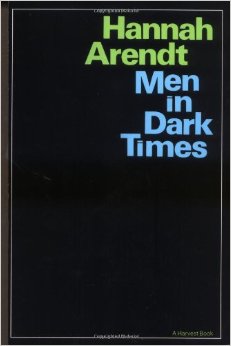New York: Harcourt Brace Jovanovich, 1968.
Summary:
“Dark times” is Brecht’s phrase, and Hannah Arendt uses it not to suggest that those she writes about are “mouthpieces of the Zeitgeist” (none in fact fit such roles), but, rather, that the routine repetitive horrors of our century form the substance of the dark against which their lives of illumination were lived. All the essays, written over a period of years, are concerned with persons–writers who (except Lessing) share the first half of the twentieth century–and only implicitly with issues. Dr. Arendt believes that “Even in the darkest of times we have the right to expect some illumination, and that such illumination may come less from theories and concepts than from the uncertain, flickering, and often weak light that some men and women, in their lives and works, will kindle under almost all circumstances and shed over the time-span that was given them on earth.”
Table of Contents:
On Humanity in Dark Times: Thoughts about Lessing
Rosa Luxemburg, 1871-1919
Angelo Giuseppe Roncalli: A Christian on St. Peter’s Chair from 1958 to 1963
Karl Jaspers: A Laudatio
Karl Jaspers: Citizen of the World?
Isak Dinesen, 1885-1963
Hermann Broch, 1886-1951
Walter Benjamin, 1892-1940
Bertolt Brecht, 1898-1956
Waldemar Gurian, 1903-1954
Randall Jarrell, 1914-1965
Online:
Google Books
Amazon
Scribd [pdf]

